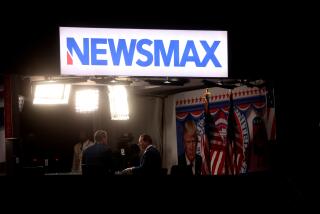Boeing slapped with jury verdict
- Share via
A Los Angeles jury Tuesday awarded at least $371 million in damages to a satellite company in a dispute against Boeing Co. over canceled plans for a satellite network that could beam television programming and other services to mobile-device users around the globe.
ICO Global Communications, whose chairman is cellular phone billionaire Craig McCaw, accused Boeing of thwarting its plans to build the network. The verdict doesn’t include punitive damages, which the jury is expected to take up next week.
McCaw said that the verdict would not “get us back to being whole again,” but that it provided some redemption.
“We feel particularly so given that it went beyond a mere dispute over a contract,” McCaw said in a telephone interview Tuesday. “It isn’t about getting even. I feel very strongly what they did was wrong.”
Boeing said in a statement that it would appeal the verdict, which came after 21 days of jury deliberations, and suggested that the case might “well take several years to run its course.”
“There were fundamental errors in the conduct of the trial,” Boeing general counsel J. Michael Luttig said. “There were fundamental errors in the instructions to the jury and in the court’s interaction with the jury during the deliberations. We thus have significant grounds for appeal.”
The initial award calculated by the jurors was actually much higher at $742.2 million, but Judge Emilie H. Elias said after the jury panel had left the courtroom Tuesday that the jurors had made an error in arithmetic.
Elias said the correct amount for the main damage award was $371 million, but she did not specify whether a $91-million award related to a rocket contract was part of it. Afterward, Boeing contended it was all part of the $371 million, while ICO said the awards were separate and totaled $462 million.
The disagreement, which the jurors probably will have to resolve next week, was par for the course for one of the more convoluted contract cases in the aerospace industry.
Boeing, which denied any wrongdoing, originally sued ICO in 2004 after ICO terminated its contract for the satellites. ICO countersued, accusing Boeing of breach of contract and fraud, among other things.
ICO was seeking $1.5 billion in actual damages -- more than $2 billion with interest -- and unspecified punitive damages. The jury began deliberations Sept. 15 after hearing testimony for 2 1/2 months.
The court battle dates to the 1990s, when ICO contracted with El Segundo-based Hughes Electronics Corp. to build and launch a dozen satellites to support a global service for beaming such services as roadside assistance and navigation information to mobile-device users.
Only two of the satellites were ever completed, and one of those was destroyed when the rocket carrying it into space exploded. The second made it into orbit but is essentially useless on its own. The other 10 sit in a local warehouse in various stages of near-completion.
Boeing inherited the problem when it bought Hughes’ satellite business in 2000. At the time, ICO was struggling to emerge from bankruptcy protection with the help of investors led by McCaw, and the telecom industry was mired in a severe downturn.
ICO contends Boeing made matters worse by demanding that the company fork over an additional $400 million to finish the job it had originally hired Hughes to perform.
At the same time, ICO alleges, Boeing was making its own inroads into the satellite-based communications business and viewed ICO as a competitor -- an allegation that Boeing denies.
In court, ICO attorneys alleged that Boeing wanted the company “dead and gone.”
Jurors, in answers to more than 100 questions, agreed with most of ICO’s claims, saying that Boeing satellite officials intentionally misled or made false representations related to satellite and rocket contracts.
Analysts say ICO is short of cash and could use money from a successful court battle to pursue its latest venture, which focuses on beaming TV programming from space to mobile-device users.
Initially, ICO hoped to sell its mobile broadcast service to people whose vehicles were already equipped with video devices, such as back-seat video players and front-seat navigation screens, said Patrick Comack, an analyst at Zachary Investment Research in Miami.
Eventually it wants to offer the service for laptops and cellphones, he said.
The company successfully launched a satellite this year that would provide the service for North American customers. But it needs to launch a backup bird soon, and also wants to get the warehoused satellites into orbit so it can expand the service to Europe and other regions. ICO also faces growing competition from services such as Qualcomm Inc.’s MediaFlo.
--
martin.zimmerman@latimes.com
More to Read
Inside the business of entertainment
The Wide Shot brings you news, analysis and insights on everything from streaming wars to production — and what it all means for the future.
You may occasionally receive promotional content from the Los Angeles Times.










